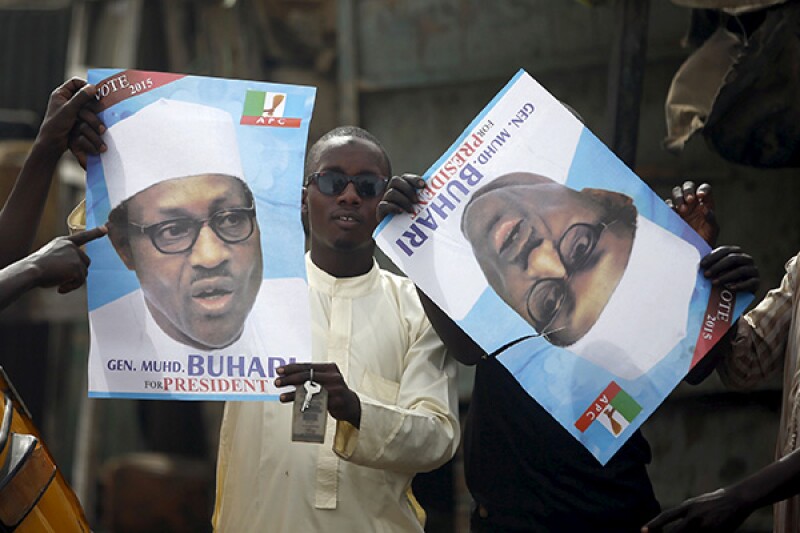
|
President Muhammadu Buhari: turning his political support on its head |
Nigeria experienced one of the biggest increases in risk worldwide during Q1 2016, according to Euromoney’s country risk survey.
Its total risk score plummeted by more than three points to 38.3 out of 100 points in the quarter, to its lowest level in three years. The drop was partly precipitated by a downgraded capital-access score as the survey’s contributing experts questioned the sovereign borrower’s creditworthiness.
It also meant a six-place drop in the global rankings to 90th out of 186 countries surveyed, to below Bolivia and Serbia – two sovereign borrowers that are rated B+ by Fitch.
On that basis, Nigeria’s BB- (stable) rating might require an adjustment.

|
It’s all about oil… corruption… policymaking…
The collapse in global oil prices since mid-2014 comes at an inopportune moment for president Muhammadu Buhari, whose first year in office was characterized by a six-month delay in forming his administration and a tendency for unorthodox policies.
At the same time as the government has been pushing back Boko Haram in the north, with some success, and making an attempt – less successfully – to root out endemic corruption, the fiscal picture has been deteriorating.
The IMF is predicting a larger deficit on the government’s consolidated operations this year, amounting to 4.4% of GDP, but it might be worse.
Exports earnings have plummeted, causing a slump in government revenue, and unemployment is rising as companies find it more difficult to operate due to the sharply rising cost of, and lack of access to, foreign exchange (FX) for import payments.
The unofficial exchange rate has fallen sharply, pushing inflation higher – to 12.8% in March. Sliding FX reserves mean import cover is edging closer to the IMF’s three-month risk minimum, at which point alarm bells start to ring, as the current-account deficit widens closer to 3% of GDP.
Worryingly, real GDP growth is predicted to slide further this year, to 2.3% from 2.7% in 2015, according to the IMF. It’s a far cry from the 6.3% pace in 2014, and will hamper development, which is crucial with such a large and rapidly expanding population, and it might not stop there with oil and gas GDP contracting sharply and non-hydrocarbon growth decelerating.
All of this increases the risks of social instability in a country noted for its religious divide and with a reputation for political violence, as the recent restaging of the Rivers state elections highlights.

|
Expert comment
ECR contributor Emmanuel Nwosu, an academic in the University of Nigeria’s department of economics, believes Nigeria’s falling risk ranking is due to the unpredictable monetary policy stance and political factors.
“The Central Bank of Nigeria has adopted several unconventional approaches in its exchange-rate management that have only created more volatility of the naira,” he says.
Indeed, Nigeria’s monetary policy/currency stability score has fallen to just 3.4 out of a maximum 10 points, and is the lowest scoring of all six economic risk indicators in Euromoney’s survey.
“On the political side, it appears the national assembly is causing serious setbacks to the executive agenda by manipulating the budget and delaying its passage,” says Nwosu.
Another ECR contributor, Gregory Kronsten, who is head of macroeconomic and fixed-income research at FBN Capital, believes Nigerian country risk has risen for a variety of reasons.
Among them are the FX shortages, an unpopular exchange-rate policy causing inflation, and the perceived sense of drift by the Buhari administration.
“The administration does have credible fiscal policies to invest in the infrastructure and diversify the economy [in terms of budget revenues and FX inflows],” says Kronsten, and yet “it is reluctant to devalue [the official exchange rate].”
Recently, the government has sought out loans and other assistance from China to bolster its reserves and obtain crucial financing for infrastructure projects.
“The process takes time, though, and GDP growth is expected to remain weak until 2018,” adds Kronsten.
Unless oil prices recover soon, it would seem Nigeria’s investor prospects are unlikely to improve.
This article was originally published by ECR. To find out more, register for a free trial at Euromoney Country Risk.